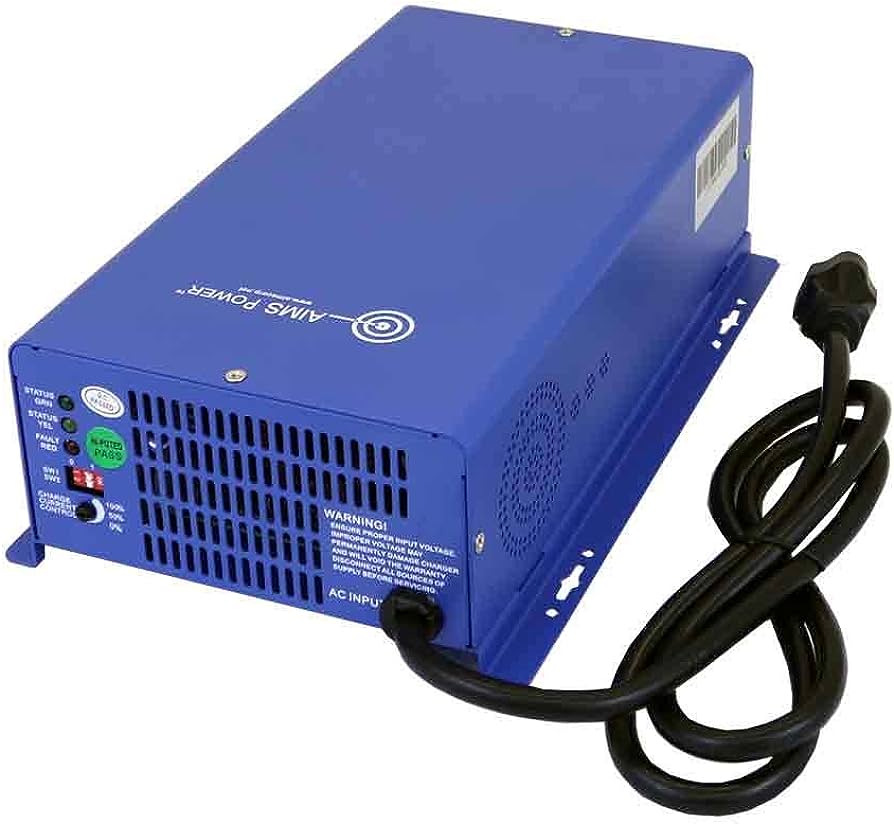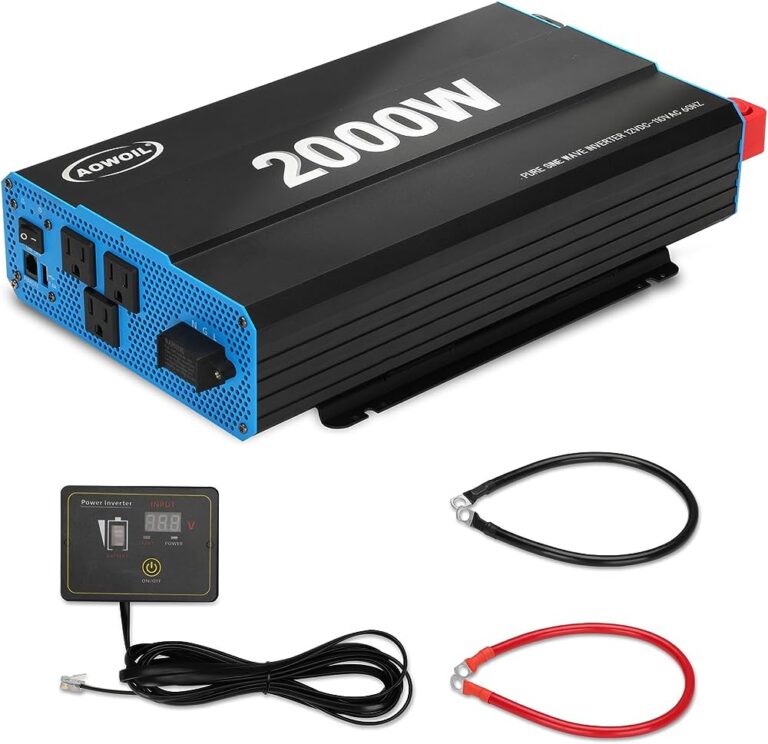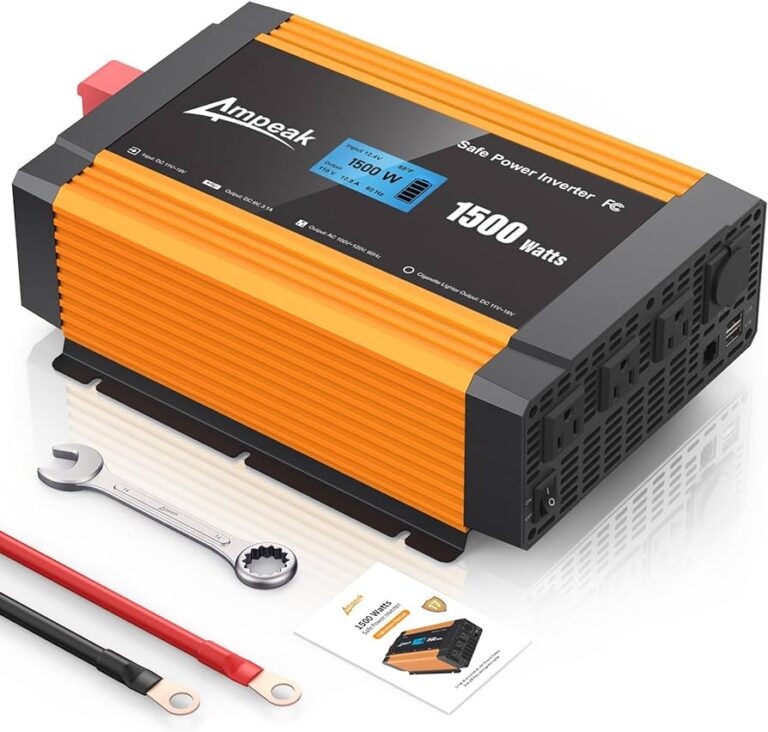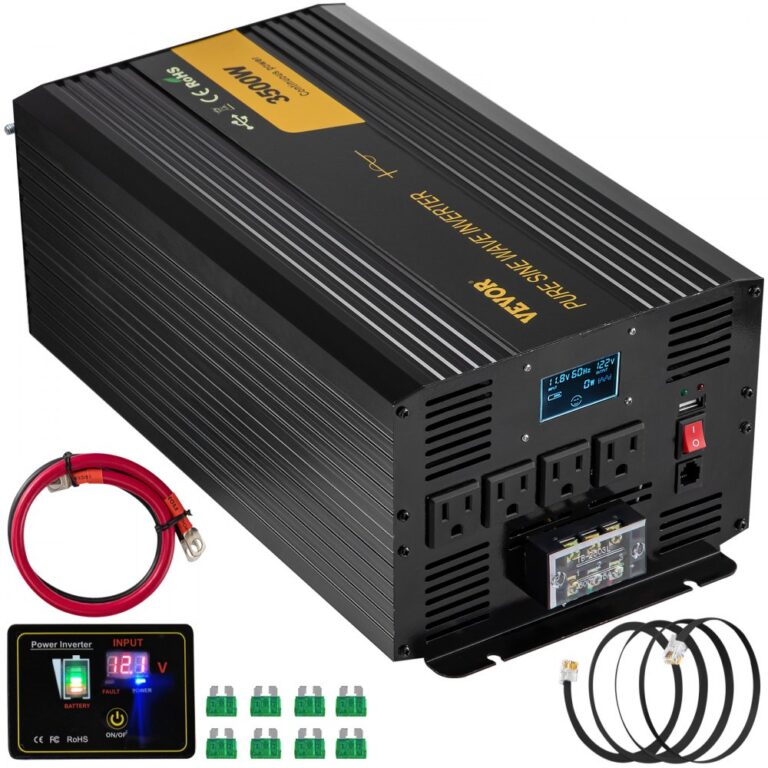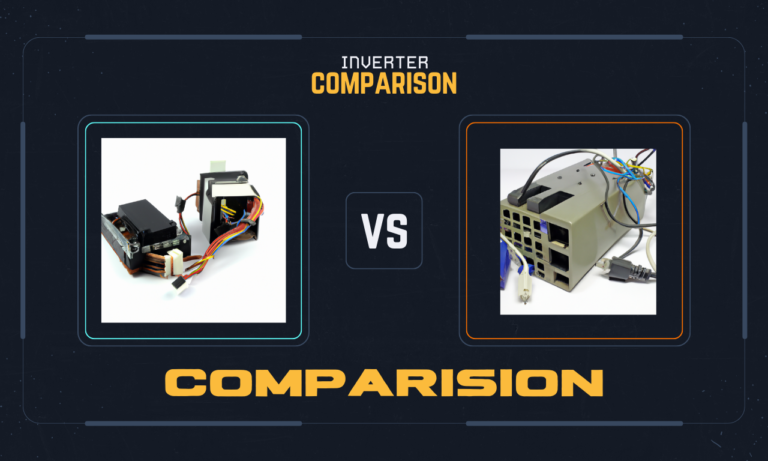Empowering High Voltage Needs: Exploring 48V to 240V Inverters And Their Practical Applications
Exploring 48V to 240V inverters and their practical applications provides insights on empowering high voltage needs. These inverters offer significant advantages over lower voltage options, such as increased efficiency and reduced power requirements.
The practical applications of these inverters range from running residential and commercial properties, to powering RV systems, trailers, and boats, making them ideal for off-grid setups and emergency backup power sources. With 48V inverters, only half the current is needed compared to 24V inverters, enabling more manageable battery wiring.
Overall, these high-voltage inverters offer superior performance and versatility for various power needs.
Table of Contents
Understanding The Power Of High Voltage

Credit: www.amazon.com
Explore the practical applications of 48V to 240V inverters and uncover their power in empowering high voltage needs. With these inverters, you can efficiently run your home, business, or off-grid system, providing a reliable and versatile power solution.
High voltage inverters play a crucial role in various applications, from renewable energy systems to industrial processes. Understanding the power of high voltage can help us unlock the full potential of these inverters. Here are some key points to consider:
- Higher voltage leads to more efficient power conversion:
- High voltage allows for reduced current, minimizing power loss during conversion.
- Efficient power conversion results in less heat generation and improved overall system efficiency.
- Exploring the benefits of high voltage inverters:
- Increased power handling capacity: High voltage enables inverters to handle higher power loads, making them suitable for large-scale applications.
- Longer transmission distances: High voltage minimizes power loss over long distances, making it ideal for transporting electricity efficiently.
- Improved system stability: High voltage inverters provide better voltage regulation and stability, ensuring reliable and consistent power output.
- The impact of high voltage on system design and performance:
- Smaller cable size: High voltage allows for the use of smaller diameter cables, reducing material and installation costs.
- Compact system footprint: High voltage inverters require fewer electrical components, resulting in more compact and space-efficient system designs.
- Improved system reliability: High voltage systems experience less voltage drop, reducing the risk of voltage fluctuations and ensuring a stable power supply.
Understanding the power of high voltage is crucial when it comes to harnessing the full potential of high voltage inverters. By exploring the benefits and impact of high voltage on system design and performance, we can empower our high voltage needs and unlock more efficient power conversion.
The Versatility Of 48V Inverters
The 48V to 240V inverters offer versatility for various high voltage needs, whether it’s for residential, commercial, or mobile applications. With their wide power range and efficient performance, these inverters are ideal for powering off-grid systems or providing emergency backup supplies.
Practical Applications Of 48V Inverters In Residential Settings:
- Powering essential home appliances during power outages: A 48V inverter can be used to provide backup power for crucial appliances such as refrigerators, lights, and security systems, ensuring uninterrupted functionality during emergencies.
- Enabling off-grid living: With a 48V inverter, homeowners can go off-grid and rely on renewable energy sources like solar panels to generate electricity. This allows them to reduce their dependence on the traditional power grid and lower their energy bills.
- Facilitating energy storage: By coupling a 48V inverter with a battery bank, homeowners can store excess energy generated from renewable sources and use it during peak demand periods or when solar energy is not available. This optimizes energy usage and reduces reliance on the grid.
Advantages Of Using 48V Inverters In Off-Grid And Backup Power Systems:
- Higher efficiency: 48V inverters offer improved efficiency compared to lower voltage inverters, resulting in reduced energy loss during the conversion process. This translates to better overall system performance and cost savings in the long run.
- Enhanced compatibility: Many modern appliances and electronic devices are designed to operate on 48 volts DC, making 48V inverters highly compatible with a wide range of electrical equipment. This allows for more seamless integration and reduces the need for additional converters or adapters.
- Scalability: 48V inverters provide a scalable solution for expanding off-grid or backup power systems. They can easily accommodate the addition of more solar panels or batteries, making it easier to meet growing energy demands as needs evolve.
Case Studies Showcasing Successful Implementation Of 48V Inverters:
- Residential Solar Installation: A homeowner in a remote location implemented a 48V inverter system combined with solar panels and battery storage. This setup allowed them to generate and store their own electricity, reducing their reliance on the grid and achieving significant cost savings on their energy bills.
- Off-Grid Cabin: An off-grid cabin owner utilized a 48V inverter to power the entire cabin. With a combination of solar panels and batteries, they were able to live comfortably without the need for a connection to the utility grid. The 48V inverter ensured a reliable power supply for various appliances and devices.
- Backup Power System for a Home Office: A freelancer working from home installed a 48V inverter with a battery bank to provide backup power for their home office during power outages. This allowed them to continue working uninterrupted, ensuring no loss in productivity or potential income.
These case studies highlight the versatility and effectiveness of 48V inverters in various residential settings, making them a viable solution for off-grid living, backup power, and energy independence.
Pushing The Limits: Exploring 240V Inverters
Explore the practical applications of 48V to 240V inverters, empowering high voltage needs with efficiency and reduced current demands. Upgrade your power supply with half the current required for the same power output, making it ideal for off-grid systems and emergency backups.
Overview Of 240V Inverters And Their Potential Applications:
- 240V inverters are high-voltage power conversion devices that convert 48V DC power into 240V AC power.
- These inverters are commonly used in commercial and industrial settings where there is a need for high-power applications.
- They are ideal for powering heavy-duty equipment, machinery, and appliances that require 240V AC power supply.
- 240V inverters provide a reliable and efficient power solution, ensuring consistent performance even in demanding environments.
- These inverters come in various designs and configurations, offering flexibility for different applications.
Benefits And Challenges Of Using 240V Inverters In Commercial And Industrial Settings:
Benefits:
- High voltage capabilities: 240V inverters can handle high-power loads, making them suitable for commercial and industrial applications.
- Efficient power conversion: These inverters convert DC power to AC power with high efficiency, minimizing energy loss.
- Versatile applications: 240V inverters can power a wide range of equipment and devices, including motors, pumps, compressors, and more.
- Cost-effective solution: By using 240V inverters, businesses can avoid the need for expensive electrical infrastructure upgrades, saving both time and money.
Challenges:
- Safety considerations: Working with high-voltage power requires proper safety measures and precautions to be in place.
- Installation complexity: Installing and configuring 240V inverters may require professional assistance due to their high-power nature.
- Maintenance requirements: Regular inspections and maintenance are essential to ensure the proper functioning of 240V inverters and prevent downtime.
Case Studies Highlighting The Use Of 240V Inverters In High-Power Applications:
- Industrial Manufacturing:
- A large-scale manufacturing facility implemented 240V inverters to power their heavy-duty machinery.
- The inverters provided stable and reliable power supply, enabling smooth production processes and reducing downtime.
- The efficient power conversion of the inverters resulted in energy savings and improved overall operational efficiency.
- Data Centers:
- Data centers require a consistent and reliable power supply to operate their servers and network equipment.
- 240V inverters were deployed to provide high-voltage power for critical equipment.
- The inverters ensured minimal power disruptions, safeguarding data integrity and maximizing uptime.
- Construction Sites:
- Construction sites often operate various power tools, lighting systems, and equipment that require 240V power.
- By utilizing 240V inverters, construction companies can access high-voltage power on-site without relying solely on grid connections.
- This flexibility improves productivity and allows for efficient operations even in remote locations.
These case studies demonstrate the practical applications of 240V inverters in diverse industries, showcasing their effectiveness in meeting high-power needs.
Frequently Asked Questions For Empowering High Voltage Needs: Exploring 48V To 240V Inverters And Their Practical Applications
What Is A 48V Inverter Used For?
A 48V inverter is used for powering various applications such as houses, businesses, RV systems, trailers, and boats. It is ideal for off-grid systems or as an emergency backup power supply. Compared to a 24V inverter, a 48V inverter has the advantage of requiring only half the amount of current to generate the same power output.
This means that with a 48V inverter, the wiring and battery system can handle a more reasonable current load. The use of high-voltage systems, including high-voltage batteries and inverters, offers several advantages. These systems tend to have better efficiency, as they minimize energy losses during the conversion process.
Additionally, high-voltage systems provide more flexibility in terms of power capacity and can handle higher loads. Using a 48V inverter can help meet high voltage needs while ensuring efficient power conversion and handling.
What Is The Advantage Of 48V Inverter Over 24V?
The advantage of a 48V inverter over a 24V inverter is that it requires half as much current to generate the same power. This means that for a 3kW output at 24V, the battery wiring would have to handle 132A, whereas at 48V, it drops to a more reasonable 66A.
This is due to the improved efficiency of the higher voltage system. By using higher voltage batteries and inverters, energy losses during conversion are reduced, resulting in better overall efficiency. This makes 48V inverters a preferable choice for applications such as running houses, businesses, RV systems, trailers, or boats, as they provide the same power output with less strain on the wiring and system components.
Additionally, 48V inverters are also suitable for off-grid systems or as emergency backup supplies.
What Are The Advantages Of A High-Voltage Inverter?
The conversion process. This leads to improved overall system efficiency and energy savings. Smaller wire size: High-voltage inverters require smaller wire sizes compared to lower voltage systems, resulting in cost and space savings. This is because higher voltages can transmit the same power with lower currents, reducing the need for thicker wires.
Longer cable runs: High-voltage systems allow for longer cable runs without significant power losses. This is beneficial in situations where the inverter is located far from the power source or where multiple inverters need to be connected over large distances.
Flexibility in system design: High-voltage inverters offer more flexibility in designing solar or energy storage systems. They can handle higher power outputs, allowing for the use of fewer inverters and reducing installation complexity. Compatibility with future technologies: High-voltage inverters are compatible with emerging technologies such as electric vehicles and smart grids.
They can integrate seamlessly with these systems, enabling efficient energy transfer and storage. In summary, the advantages of a high-voltage inverter include better efficiency, smaller wire size, longer cable runs, flexibility in system design, and compatibility with future technologies.
Why Is 48V Inverter Better Than 12V Inverter?
High-voltage inverters, such as a 48V inverter, are better than 12V inverters for several reasons. First, a 48V inverter requires less current to produce the same power as a 12V inverter, resulting in higher efficiency. Second, high-voltage systems allow for the use of high-voltage batteries and inverters, which can minimize energy losses during conversion.
Third, 48V inverters are able to handle larger loads and provide more stable and reliable power, making them suitable for heavy-duty applications like running a house or business. Additionally, 48V inverters are commonly used in off-grid systems and emergency backup supplies.
Overall, the higher voltage of a 48V inverter offers improved efficiency, reliability, and performance compared to a 12V inverter.
Conclusion
Resulting in less energy loss during conversion. Increased power capacity: High-voltage inverters can handle larger loads, making them suitable for high-power applications like industrial machinery or large-scale solar installations. Improved safety: High-voltage systems often have better safety features, such as advanced protection circuitry and isolation mechanisms.
Flexibility in system design: With high-voltage inverters, it is possible to design more efficient and compact systems, as lower currents allow for the use of smaller, lighter wiring and components. Future-proofing: As technology advances, high-voltage systems are becoming more prevalent, so investing in a high-voltage inverter ensures compatibility with emerging energy storage and renewable energy technologies.
48V to 240V inverters offer numerous practical applications, providing efficient, powerful, and future-proof solutions for a wide range of high voltage needs.

